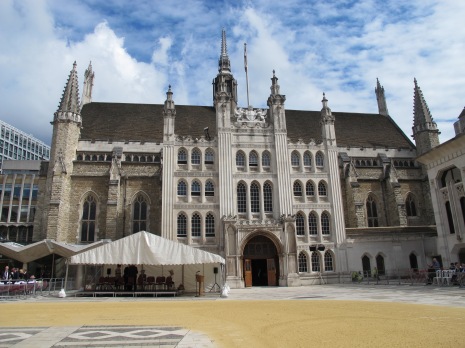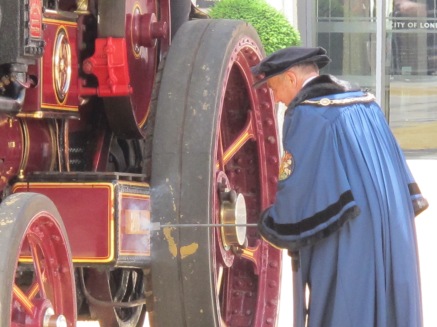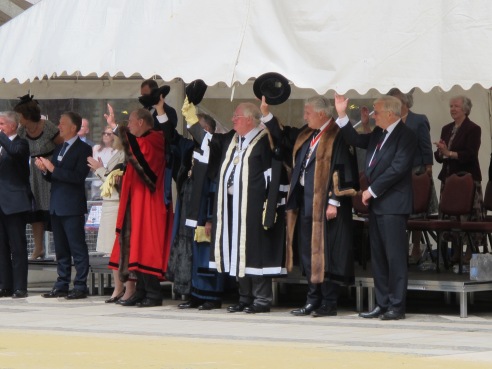I’ve recently written about a couple of events that are, by any reckoning, traditional – steps into the past, glimpses of an old England. But, as LP Hartley wrote in The Go-Between, ‘The past is another country: they do things differently there.’ There is no rule that says we can never change the way things are done. So what is tradition, and what is it for?
Certainly it’s a glue that holds together societies and groups that media commentators like to call ‘closely knit’. Try this, the opening chorus from Fiddler on the Roof, which sets the tone for the whole show:
Who, day and night, must scramble for a living,
Feed a wife and children, say his daily prayers?
And who has the right, as master of the house,
To have the final word at home?
The Papa, the Papa! Tradition!
Who must know the way to make a proper home,
A quiet home, a kosher home?
Who must raise the family and run the home,
So Papa’s free to read the holy book?
The Mama, the Mama! Tradition!
At three, I started Hebrew school. At ten, I learned a trade.
I hear they’ve picked a bride for me. I hope she’s pretty.
The son, the son! Tradition!
And who does Mama teach to mend and tend and fix,
Preparing me to marry whoever Papa picks?
The daughter, the daughter! Tradition!
This is some of the glue that holds together – obviously central to the survival of groups who, like the community in that powerful musical, were subjected to savage oppression and injustice. Equally, I remember the former politician Edwina Currie, talking about the faith she was born into, quoting with admiration a rabbi who told her that her faith was her home, not her prison: tradition in its best sense, I would say.
Politicians and moralists love to appeal to tradition. The trouble is, where’s the consensus about what it means? Traditional family values? Like the Victorian ones where incest and prostitution were rife in Britain? Like the ones from the dawn of time that treated daughters as the father’s property, to be disposed of at will, barely pubertal?
What is tradition, and what is it for?
Tradition ist Schlamperei, Gustav Mahler said: Tradition is sloppiness – an exclamation provoked by what he found when he took charge of the Vienna Court Opera in 1897, and decided (against his own interests) to scrape as many barnacles as he could off that listing ship. Following tradition can, of course, be a lazy substitute for stopping to think.
But plenty of traditions are entirely benign, harmless and make people happy. Staying on the Vienna music scene, no one seriously objects when the traditional New Year’s Day concert ends with the (supposedly unscheduled) Blue Danube Waltz and the Radetzky March. There would be riots if it didn’t. Is it a problem if, the night before, we link arms and sing Auld Lang Syne – even if most of us don’t have the faintest what some of the words mean? Or if people go on dressing up to go to the opera at Glyndebourne? Or the Worshipful Company of Carmen go on year after year with the purely ceremonial marking of carts in the Guildhall Yard?
These are things that make people happy, and the world would not be a better place if we stopped them just because they are old. My best friend, in many ways a much more conservative thinker than me, is a passionate republican. My view is that the monarchy just happens to work – maybe, to develop Winston Churchill’s famous remark, democracy with a constitutional monarch is the worst way to run a country – apart from all the others. Royalty with its barely changing traditions just makes people happy, provides a purely symbolic headship and is, for all practical purposes, harmless. In any case, what happens when a country elects a President? Look around you.
Plunging into another round of Christmas traditions, there’s no harm in just deciding what works for you, and doing it. Those sad people who think it’s clever to say I’ll be glad when it’s all over wouldn’t dream about not doing it at all! They love being slaves. Christmas though, because inevitably it reaches back deep into childhood, gives a decent clue about what tradition really is.
It was Napoleon, no less, who said If you want to understand a person in authority, think of the world as it was when they were 20 or 21. As far as I can see, appeals to tradition (think of politicians talking about supposed family values, Sunday trading, nationalism, constitutional arrangements …), usually boil down to one central thought: if we’re honest, when someone speaks noisily of tradition, what they usually mean is:
What things were like when I was growing up









